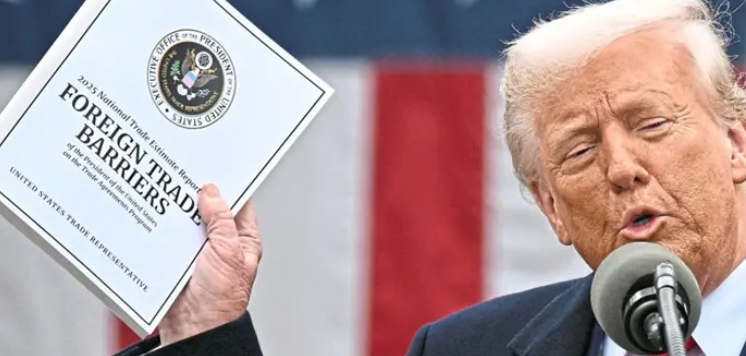
BIX ARTICLE
Tariff chaos reigns and America’s economy suffers
Sep 08, 2025
|
4 min read
Featured Posts
Social Bonds Illustrative Use-Of-Proceeds Case Studies Coronavirus
Jul 06, 2020
|
2 min read
Sustainable Banking Network (SBN) Creating Green Bond Markets
Jul 06, 2020
|
2 min read
Why is Inflation Making a Big Comeback After Being Absent for Decades in the U.S.?
Mar 24, 2022
|
7 min read
SC issues Corporate Governance Strategic Priorities 2021-2023
Mar 29, 2022
|
3 min read
COULD most of the tariffs with which President Donald Trump has shocked the world actually be illegal?
Sometime in the coming months, the Supreme Court might provide an answer. Meanwhile, the task of managing the United States’ economy will become all the more difficult.
The US Court of Appeals for the Federal District has given Trump until Oct 14 to appeal its ruling that he overstepped his authority in imposing tariffs under the International Emergency Economics Powers Act.
If the Supreme Court concurs – Congress, after all, has the sole constitutional power to tax and spend – the proportion of US imports subject to the levies could drop to about 16% from nearly 70%, according to the Tax Foundation.
Yet Trump needn’t give up there. He could impose tariffs on the grounds of national security (Section 232 of the Trade Expansion Act of 1962), unfair trade practices (Section 301 of the Trade Act of 1974) or persistent trade deficits (Section 122, same). All these approaches have weaknesses, promising varying degrees of complexity, delay and further legal wrangling.
Thus, uncertainty about the level and scope of tariffs has risen yet again, with negative consequences for the economy.
For one, it’ll weigh on investment and hiring decisions, dampening growth. Businesses will be understandably hesitant to make big commitments when the rules of the game are changing rapidly.
Second, it’ll complicate the Federal Reserve’s job, just when officials were about to start cutting interest-rate as Trump has long demanded.
Companies will likely be slower to pass cost increases on to their consumers, making it harder for the Fed to discern whether the rise in inflation will be temporary or more persistent – and hence whether inflation or a weakening labor market is the greater risk.
This could confound efforts to achieve a “soft landing,” in which the central bank is able to push inflation down to its 2% target without triggering a recession.
Third, it could cloud the U.S. government’s fiscal outlook. Tariffs are bringing in considerable revenue – nearly US$30bil (RM126.7bil) in July, more than triple the level of a year earlier. Treasury Secretary Scott Bessent has said that the annual income could be more than US$500bil (RM2.1 trillion), or about a quarter of the vast budget deficit. If that revenue wasn’t forthcoming, investors might become more worried about the fiscal outlook and less willing to lend to the US government, driving up longer-term interest rates.
The revenue also illustrates how difficult the tariffs, if they stick, will be to unwind later.
No future administration will be able to cut US$500bil a year from spending. Most federal outlays are in the untouchable areas of defense, Medicare and Social Security and debt service, the last three of which are set to rise sharply over the next decade.
Boosting tax income is economically feasible – US federal government revenue is about 17% of GDP, far lower than most other developed countries – but politically fraught, given that it would entail very large increases on households and businesses.
Another period of uncertainty, then, may not be the worst outcome. That could be America’s addiction to the tariff revenue. — Bloomberg Opinion/TNS
Bill Dudley is a former president of the Federal Reserve Bank of New York and a member of Coinbase Global’s advisory council.
Aticle by: BILL DUDLEY
Disclaimer
The information provided in this report is of a general nature and has been prepared for information purposes only. It is not intended to constitute research or as advice for any investor. The information in this report is not and should not be construed or considered as an offer, recommendation or solicitation for investments. Investors are advised to make their own independent evaluation of the information contained in this report, consider their own individual investment objectives, financial situation and particular needs and should seek appropriate personalised financial advice from a qualified professional to suit individual circumstances and risk profile. The information contained in this report is prepared from data believed to be correct and reliable at the time of issuance of this report. While every effort is made to ensure the information is up-to-date and correct, Bond and Sukuk Information Platform Sdn Bhd (“the Company”) does not make any guarantee, representation or warranty, express or implied, as to the adequacy, accuracy, completeness, reliability or fairness of any such information contained in this report and accordingly, neither the Company nor any of its affiliates nor its related persons shall not be liable in any manner whatsoever for any consequences (including but not limited to any direct, indirect or consequential losses, loss of profits and damages) of any reliance thereon or usage thereof.
YOU MAY ALSO LIKE
ARTICLE
Feb 16, 2026
|
5 min read
ARTICLE
Feb 12, 2026
|
4 min read
ARTICLE
Feb 06, 2026
|
5 min read
ARTICLE
Feb 06, 2026
|
3 min read



